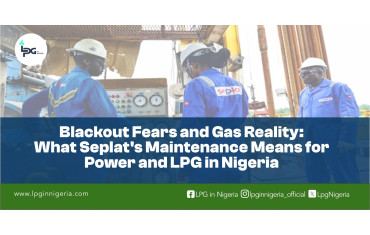- 4606
- 0
Sharing Ideas and Updates on LPG in Nigeria and related information to enable effective collaboration within the LPG Value Chain
NATURAL GAS AS A BRIDGE FUEL FOR LIQUEFIED PETROLEUM GAS

Natural Gas is a fossil fuel that has been used for centuries to power homes, businesses, and industries. It is a clean-burning fuel that emits fewer greenhouse gases than other fossil fuels like coal and oil. In this article, we will explore what natural gas is, where it comes from, what it is used for, and why it is important.
What is Natural Gas?
Natural gas is a mixture of hydrocarbons that are found deep beneath the earth's surface. It is formed from the remains of plants and animals that lived millions of years ago. Over time, heat and pressure transformed these organic materials into the fossil fuel we know as natural gas.
The primary component of natural gas is methane (CH4), which makes up about 70-90% of its composition. Other components include ethane (C2H6), propane (C3H8), butane (C4H10), and pentane (C5H12). These compounds give natural gas its distinct odorless and colorless properties.
Why Is Natural Gas Important?
Natural gas plays a critical role in meeting our energy needs while also reducing our reliance on more polluting fossil fuels like coal and oil. In fact, natural gas and the shale boom played a key role in helping the United States achieve energy independence.
Here are some reasons why natural gas is important:
Clean-burning: Natural gas emits fewer greenhouse gases than other fossil fuels when burned.
Abundant: There are vast reserves of natural gas located around the world.
Reliable: Natural gas infrastructure is well-established in many parts of the world.
Flexible: Natural gas can be used for a variety of applications across different sectors.
Cost-effective: Natural gas prices have historically been lower than those for other fossil fuels.
As countries around the world work to transition to cleaner sources of energy, natural gas will continue to play an important role in meeting our energy needs while reducing our impact on the environment.
Natural Gas as a Bridge Fuel
Natural gas is often referred to as a "bridge fuel" because it can serve as an interim solution on the path toward a more sustainable energy future. As we work towards reducing our reliance on fossil fuels altogether in favor of renewable energy sources like wind and solar power, natural gas can play an important role in helping us transition away from dirtier fuels like coal and oil.
One reason why natural gas is seen as a bridge fuel is that it emits fewer pollutants than coal or oil when burned for energy production. This means that it can help reduce air pollution and improve public health while we continue to develop cleaner energy sources. Natural gas can also be used as a backup power source for renewable energy systems like wind and solar, helping to ensure that there is always reliable electricity available even when the weather conditions are not favorable for these renewable sources.
Is LPG the Same as Natural Gas?
Gas production is generally a chemical process. But is LPG the same as natural gas, given that other gases come about due to chemical composition? That question is only answerable after an in-depth look at the elements that make up each of the two fuels. Technically, the two energy sources have different chemical compositions.
LPG is liquefied petroleum gas which is either propane or butane with a heat content of 93.2MJ/m3. On the other hand, natural gas is primarily methane and has a heat content of 38.7MJ/M3. Both are crude oil products, but the energy content and density are different. LPG comes in cylinders while natural gas in pipelines.
Are They the Same?
The only similarity between the two is that they are both highly combustible. However, the fact that LPG gas has a higher calorific value means that a little bit of it goes a long way than natural gas. There is also a close similarity between LPG and natural gas in that LPG comes from natural gas processing.
LPG produces a higher content of carbon dioxide than natural gas during combustion. It is also more readily available than natural gas, and so is the reference in the market. Both are flammable hydrocarbon gases, but it does not mean that they are the same. Natural gas or LPG are both applicable in-home or business.
Propane or LPG
LPG can either be propane gas or butane. Note that propane is not natural gas but is a product of the processing of natural gas. It’s transported in cylinders where it is stored under pressure.
Propane is heavier than air, unlike natural gas, which is lighter than air. Its chemical formula is C3H4. It can be compressed into liquid form and transported or stored. As for propane in appliances, they operate at a pressure similar to those for methane.
Knowing the Similarities and Differences.
Now that you know the answer to the question “is LPG the same as natural gas,” you should never confuse between the two as they are different. It starts from each gas’s heat content to how they are stored, transported and the differences in costs.
















0 Comment.